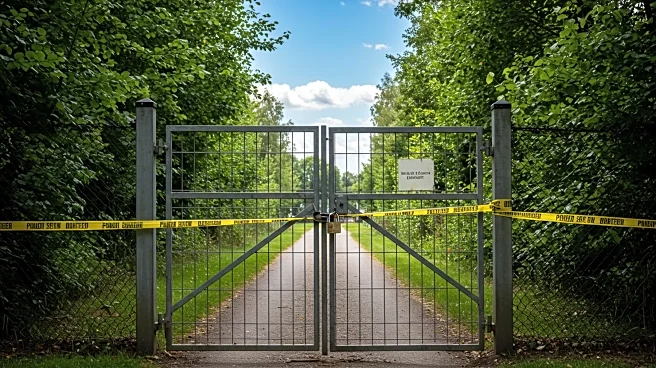What's Happening?
A federal judge has issued a preliminary injunction to halt the expansion and initiate the closure of a controversial immigration detention center in Florida, known as 'Alligator Alcatraz.' Located in the Everglades, the facility has faced criticism from environmental advocates who argue it violates crucial environmental laws. US District Judge Kathleen Williams formalized the temporary halt, expecting the population of the facility to decline within 60 days. The state of Florida has filed a notice of appeal against the ruling. The facility, which President Trump toured last month, was intended to hold up to 3,000 detainees but currently houses several hundred. Environmental groups and the Miccosukee Tribe have raised concerns about the impact on sensitive wetlands and endangered species.
Why It's Important?
The closure of the 'Alligator Alcatraz' facility highlights the ongoing tension between immigration policies and environmental conservation efforts. The ruling is seen as a victory for environmental groups and the Miccosukee Tribe, emphasizing the importance of adhering to environmental laws. The decision could impact future immigration detention projects, particularly those planned in ecologically sensitive areas. It underscores the need for government leaders to balance infrastructure expansion with environmental preservation. The case also reflects broader debates on immigration policy under President Trump's administration, which has prioritized increasing deportations.
What's Next?
The state of Florida's appeal against the judge's ruling suggests a prolonged legal battle over the facility's future. If the appeal is unsuccessful, the state and federal defendants will need to comply with environmental assessments before any further construction. The ruling may prompt other states to reconsider similar projects, especially those in environmentally sensitive regions. Environmental groups are likely to continue monitoring and challenging projects that threaten natural habitats. The decision could influence public policy discussions on immigration and environmental protection, potentially leading to legislative changes.
Beyond the Headlines
The case raises ethical questions about the treatment of detainees and the prioritization of environmental laws. Reports of poor conditions within the facility, including inadequate sanitation and healthcare, highlight human rights concerns. The ruling may encourage greater scrutiny of detention centers nationwide, focusing on both environmental and humanitarian standards. Long-term, the decision could contribute to shifts in public opinion regarding the balance between immigration enforcement and environmental conservation.









